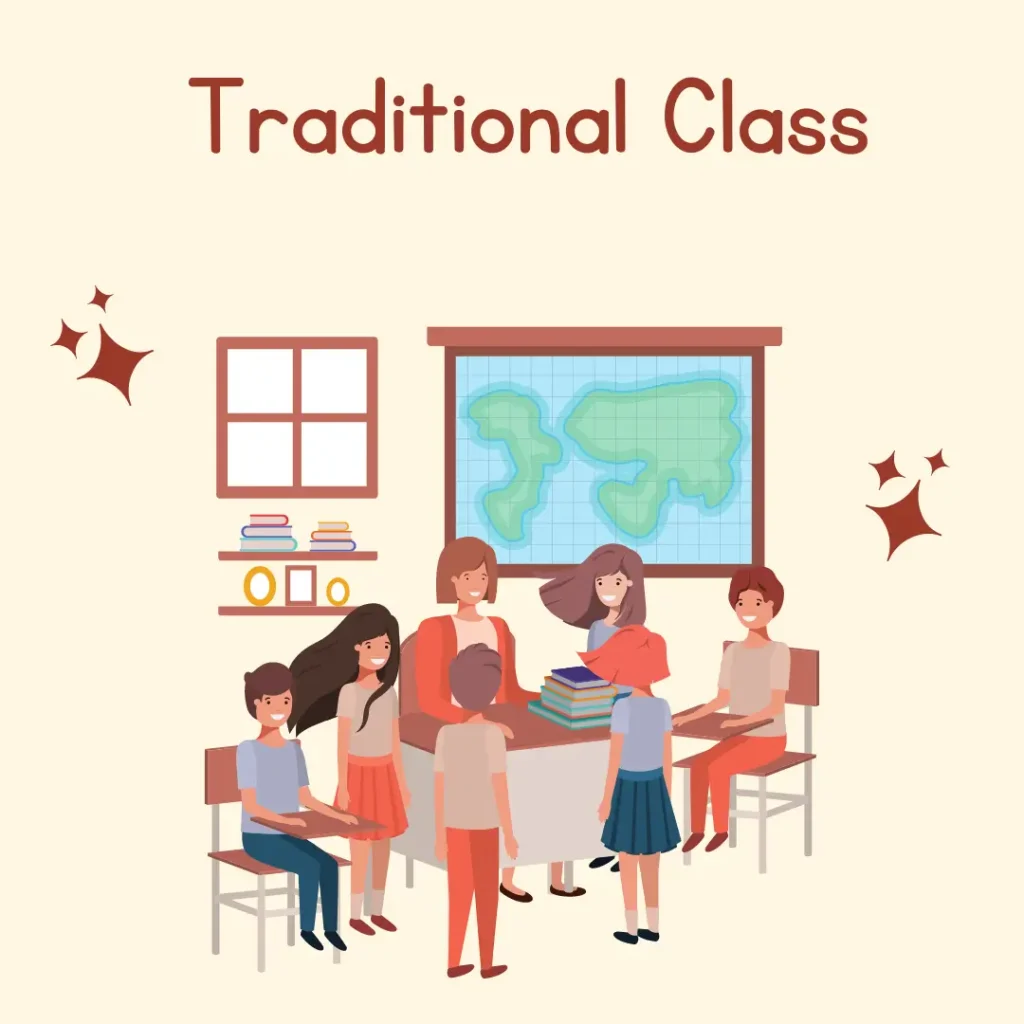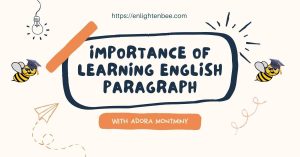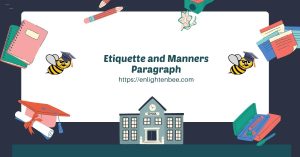1 Online Class and Traditional Class Paragraph
Online classes are a newer form of learning that uses the internet. Traditional classes are the old way where students go to a physical place to learn. Both types have good points and bad points. Online classes are flexible, which means they can fit into any schedule. You can take a class whenever you have free time, even if it’s at night. This makes online classes a good choice for people who have jobs or other commitments. But, online classes require self-discipline. You need to make yourself do the work because there’s no teacher there to remind you. On the other hand, traditional classes have a fixed schedule. You have to be in a particular place at a specific time. This can be hard for people with busy schedules. However, traditional classes are good for people who learn better when they can ask questions and get answers immediately. They also help students develop social skills by interacting with classmates and teachers. So, both online and traditional classes have their advantages and disadvantages. The choice depends on the learner’s needs, lifestyle, and preferences.
Meaning of difficult words for Online Class and Traditional Class Paragraph:
- Newer – নতুন – More recent.
- Flexible – পরিবর্তনশীল – Able to be easily modified to respond to altered circumstances.
- Commitments – অঙ্গীকার – Engagements or obligations that restrict freedom of action.
- Self-discipline – আত্ম শাসন – The ability to control one’s feelings and overcome one’s weaknesses.
- Fixed – নির্ধারিত – Set or decided in advance.
- Interacting – যোগাযোগ – Communicate or be involved directly.
- Advantages – সুবিধা – A condition or circumstance that puts one in a favorable position.
- Disadvantages – অসুবিধা – An unfavorable circumstance or condition that reduces the chances of success or effectiveness.
- Preferences – পছন্দ – A greater liking for one alternative over another or others.
2 Online Class and Traditional Class Paragraph
Online learning and traditional classroom education are two different paths that cater to different kinds of learners. Online education offers a level of convenience that can’t be matched by traditional classroom settings. For example, if you’re a working professional or have a family to look after, online education allows you to balance these commitments with your educational goals. You can attend classes, complete assignments, and participate in discussions at your own pace and on your schedule. However, online education also demands a high level of discipline and self-motivation. You have to be proactive about your learning because you won’t have a teacher constantly guiding you. In contrast, traditional classrooms provide a structured learning environment. Here, you can engage in face-to-face interactions, which can make learning more immersive and dynamic. For many students, direct interaction with teachers and classmates is crucial for understanding complex topics and for building social skills. However, this mode of learning may not be as flexible and can be challenging for those with other significant commitments. Therefore, the choice between online and traditional education ultimately depends on an individual’s specific circumstances and learning style. Both modes of education have their merits and shortcomings, and it’s essential to choose the one that best aligns with your needs and lifestyle.

Meaning of difficult words for Online Class and Traditional Class Paragraph:
- Convenience – সুবিধা – The state of being able to proceed with something with little effort or difficulty.
- Professional – পেশাদার – Engaged in a specified activity as one’s main paid occupation rather than as an amateur.
- Commitments – অঙ্গীকার – An agreement or pledge to do something in the future.
- Discipline – শৃঙ্খলা – The practice of training people to obey rules or a code of behavior.
- Self-motivation – স্ব-অনুপ্রেরণা – The ability to do what needs to be done, without influence from other people or situations.
- Proactive – অগ্রগামী – Creating or controlling a situation rather than just responding to it after it has happened.
- Structured – কাঠামোযুক্ত – Arranged in a definite pattern.
- Engage – যুক্ত করা – Occupy or attract (someone’s interest or attention).
- Immersive – মুগ্ধ করা – Providing, involving, or characterized by deep absorption or immersion in something (such as an activity or a real or artificial environment).
- Dynamic – গতিশীল – Characterized by constant change or progress.
- Crucial – অত্যাবশ্যক – Of great importance.
- Circumstances – পরিস্থিতি – A fact or condition connected with or relevant to an event or action.
- Merits – গুণ – The quality of being particularly good or worthy, especially to deserve praise or reward.
- Shortcomings – অপরিপূর্ণতা – A fault or failure to meet a certain standard, typically in a person’s character, a plan, or a system.
- Aligns – সামঞ্জস্যপূর্ণ – Place or arrange (things) in a straight line.
3 Online Class and Traditional Class Paragraph
In the realm of education, two primary contenders vie for the spotlight: traditional, in-person learning and the relatively modern concept of online classes. Online classes are an innovation sparked by advancements in technology, providing unprecedented accessibility and flexibility. They enable learners to transcend geographical confines, allowing students worldwide to tap into resources and knowledge they might otherwise not have access to. Online classes also champion self-paced learning, which proves to be a boon for those juggling multiple responsibilities alongside their educational pursuits, as it allows for the harmonization of work, education, and personal life.
In contrast, traditional classes offer a sense of structure and routine, which can serve as a scaffold to support students’ educational journey. Direct, face-to-face interactions facilitate immediate feedback and discussions, thereby creating an immersive, dynamic learning environment. Additionally, these interactions help hone students’ social skills and foster a sense of community.
However, the ultimate choice between online and traditional classes is highly subjective, hinging on an individual’s unique circumstances, learning style, and personal preferences. Both modes of education have their distinct merits and limitations, and the task lies in identifying the approach that best aligns with one’s educational aspirations and lifestyle.
Meaning of difficult words for Online Class and Traditional Class Paragraph:
- Realm – অধিকারভূমি – a field or domain of activity or interest.
- Contenders – প্রতিযোগী – competitors or rivals.
- Innovation – নতুন পদ্ধতি – a new method, idea, product, etc.
- Unprecedented – অভূতপূর্ব – never done or known before.
- Boon – বরদান – a thing that is helpful or beneficial.
- Scaffold – মচা – a raised platform or stage for support.
- Facilitate – সহজ করা – make (an action or process) easy or easier.
- Immersive – মনমুগ্ধকর – seeming to completely surround someone in a way that feels real.
- Subjective – স্বার্থভিত্তিক – based on or influenced by personal feelings, tastes, or opinions.
- Aspirations – আকাঙ্খা – a hope or ambition of achieving something.
4 Online Class and Traditional Class Paragraph
While the concept of online education continues to evolve and prosper, the essence of traditional classes holds its ground, each model offering its distinct set of advantages. The flexibility and accessibility of online classes enable students to manage their study schedules around work and family commitments. It provides an opportunity for self-paced learning, which can be ideal for students who need additional time to grasp concepts or prefer to accelerate their studies. Online classes are not bound by geographical constraints, making it possible to access courses and programs irrespective of location.
Traditional classroom learning, on the other hand, provides a structured format that many students find beneficial. There’s something to be said for the discipline that arises from having a set schedule, defined classroom rules, and the immediate consequences of not adhering to them. In-person learning also has the added benefit of face-to-face interaction with instructors and peers. This direct contact aids in establishing a stronger connection, which can contribute to better understanding and learning.
Nevertheless, neither of these learning modes can be termed as superior or inferior to the other. They cater to different learning styles and circumstances. Some students might find the flexibility of online learning appealing, while others may thrive in the structured environment of a traditional classroom. Ultimately, the most effective learning method is the one that suits an individual’s unique needs and circumstances, fostering their growth and development while accommodating their lifestyle. This continuous evolution of education, combining the merits of both modes, could potentially lead to a more inclusive and versatile learning landscape in the future.

Meaning of difficult words for Online Class and Traditional Class Paragraph:
- Evolve – বিকাশ পাওয়া – develop gradually.
- Prosper – উন্নতি করা – succeed or flourish.
- Flexibility – পরিবর্তনশীলতা – the quality of being able to be easily modified.
- Accessibility – প্রবেশযোগ্যতা – the quality of being able to be reached or entered.
- Constraints – বাধা – limitations or restrictions.
- Structured – সংরচিত – arranged in a definite pattern.
- Adhering – মেনে চলা – stick fast to.
- Interaction – মৌখিক যোগাযোগ – reciprocal action or influence.
- Superior – উচ্চতর – higher in rank or status.
- Inferior – নিম্নগামী – lower in rank or status.
- Versatile – বহুমুখী – able to adapt or be adapted to many different functions or activities.
- Inclusive – সম্পূর্ণ – not excluding any of the parties or groups involved in something.
Most Important Paragraph List
| # | Paragraph Name | Link |
| 1 | Adolescence Paragraph | Click Here |
| 2 | Deforestation Paragraph | Click Here |
| 3 | Environment Pollution Paragraph | Click Here |
| 4 | Global Warming Paragraph | Click Here |
| 5 | Load Shedding Paragraph | Click Here |
| 6 | Price Hike paragraph | Click Here |
| 7 | Road Accident paragraph | Click Here |
| 8 | Tree Plantation paragraph | Click Here |
Join Our Community on Facebook.









